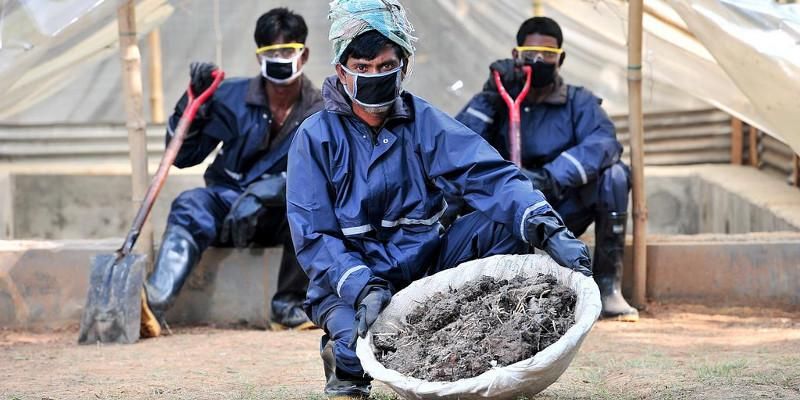
Developing countries struggling to cope with huge volumes of human waste may finally get some relief – and a new business opportunity.
A new study has found that spreading the cost of waste removal over a series of monthly payments could make it more affordable for poor households and help kick start the conversion of this waste, known as fecal sludge, into profitable by-products such as fertilisers and bioenergy.
Published this week in the journal PLoS ONE, the study focuses on a rural area of Bangladesh, where the government is looking to pilot an innovative local service for sludge management. Professor Barbara Evans, from Leeds' Faculty of Engineering, is the study's co-author.
Currently, households struggle to pay a lump sum of US$13 every three to four years to empty their pit latrines. This is approximately 14 per cent of their monthly income.
Instead, the study found they could pay small monthly payments of as little as US$0.31 per month – about what they spend each month on a mobile phone service – over the same period.
“The way sludge is currently collected is both inefficient and unsafe,” said the study’s first author Dr Soumya Balasubramanya, a scientist with the International Water Management Institute (IWMI), which leads the CGIAR global research program on Water, Land and Ecosystems.
“Our study re-imagines the economics of waste collection, disposal and reuse from the ground up. Rather than collecting waste on an ad hoc basis, our system would build a strong, guaranteed consumer base and a steady flow of capital, which would allow waste collection businesses to invest in improving their equipment and services.”
Despite Bangladesh making rapid progress in rural sanitation, having built about 40 million pit latrines, a financially viable solution for emptying these pits and transporting the sludge to a central location for treatment has not yet been found.
“When pits fill up, households currently hire someone to empty them, but this service creates health and environmental problems by dumping the sludge close by, as no central treatment plants exist yet,” said Rizwan Ahmed, a co-author of the study with Bangladesh NGO Forum for Public Health.
“If sludge removal could be offered on a subscription basis, the cost would be more manageable for households, and critically it would help streamline the logistics of taking the sludge safely away for treatment, preventing contamination of groundwater and the spread of infections.”
“Our strategy is to focus on finding ways of making this a worthwhile business proposition and professionalising the management of waste.”
“Emptying the fecal sludge is not only hazardous but is also a very low-grade occupation,” said Professor Evans, who is a member of the Water@Leeds research team and is based in the University's Faculty of Engineering.
She added: “Our strategy is to focus on finding ways of making this a worthwhile business proposition and professionalising the management of waste. We also want to see a shift from seeing human excreta as a ‘waste’ to recognising its potential as a ‘resource’.”
The study concludes that households are willing to cover at least half the costs of the proposed system, while the remainder may initially need to be funded by the government.
However, revenue from the sale of waste by-products such as fertiliser and energy may offer another potential source of funds in the future. Early experiments into producing compost is already showing promise, especially for large-scale plantations growing non-edible commodities like rubber or cotton.
The study’s results have already helped bring the issue to the attention of policymakers, and influenced the development of Bangladesh’s first regulatory framework for fecal sludge management.
“It’s very encouraging to see the government now turning its attention to the challenge of managing the fecal sludge that on-site sanitation generates,” said Jeremy Bird, director general of IWMI. “Our research has shown that a very simple concept like cost-spreading can put the critical transportation link in the sanitation chain on a firm financial footing.”
“Until this study, we knew next to nothing about those costs and people’s willingness to pay them in rural areas,” said Dr Balasubramanya.
“The proposed system would offer clear benefits for individuals – convenience, privacy and better health – and that’s why they’re willing to pay,” explained Rizwan Ahmed. “But the benefits to society – reduced health risks and less environmental pollution – would be even greater.”
The release of the study, funded by the Government of the Netherlands, coincides with World Water Day on 22 March, which this year focuses on the pressing issue of wastewater management.
According to UN-Water, 80% of all wastewater, including fecal sludge, gets dumped without treatment, leading to a range of health and environmental risks. The problem is especially grave in the expanding cities and overpopulated rural areas of low-income countries, where only 8% of wastewater is treated.
Further information
The research paper Towards Sustainable Sanitation Management: Establishing the Costs and Willingness to Pay for Emptying and Transporting Sludge in Rural Districts with High Rates of Access to Latrines was published in PLoS ONE on Tuesday 21 March.
The picture above shows pit latrine workers in Bangladesh who collect and transport human waste to a site where it is processed into fertiliser. Image: Neil Palmer (IWMI).
Professor Evans is available for interview, contact Peter Le Riche in theUniversity of Leeds press office on 0113 343 2049 or email p.leriche@leeds.ac.uk